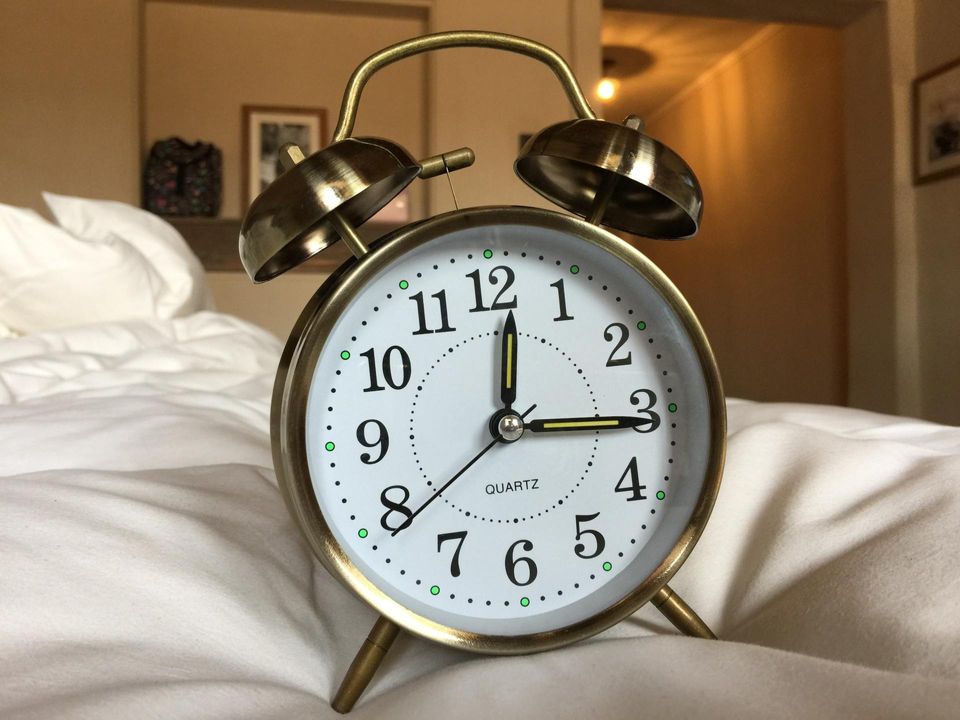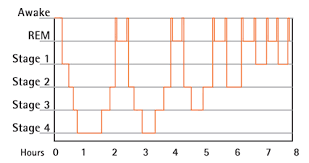Sleep Cycles
(a.k.a. Why do I always wake up overnight?)

I was asked to write a blog post to explain why we often wake up overnight and what we can do to prevent it. In order to do so, it is first essential that I explain how we sleep. This blog is therefore about the theory of the human sleep cycle and my next post will focus more on how we can use this theoretical knowledge in more practical terms to our advantage.
Humans (like most animals) do not sleep in one solid block of sleep that is all the same. We sleep in a series of sleep cycles, passing in and out of different types (REM and non-REM) and different depths (stages 1-4) of sleep and wakefulness throughout the night.
Sleep cycles change in terms of their length and constituents as we progress through the night and also as we age. For more information on the difference in sleep at various ages, please see my other blog posts on how sleep changes with age.
An adult sleep cycle during the first part of the night lasts for 90 minutes, with the majority of that time spent in deep non-REM sleep. However, as we progress through the night, our sleep cycles get shorter and shorter and the proportion of REM to NREM switches so that by the morning, our sleep is dominated by REM and the lighter stages of NREM sleep.
The sleep graph (hypnogram) above gives a simplistic outline of a young adult’s sleep throughout a night or an eight hour period. As you can see at the left hand side of the graph, we start off awake, drift quickly through sleep stages one to three and then spend approximately an hour in deep NREM sleep. Following this we come back up through the stages of sleep, hitting a short period of REM sleep at the end of the cycle before another cycle begins.
In the sleep cycles that follow, it takes us longer and longer to get in to and out of deep NREM sleep and we spend less and less time actually in this stage, with the last three or four cycles containing no deep sleep at all. You can also see that the total time taken to go through each cycle at this point is significantly reduced (around 45-55 minutes).
Our level of consciousness (awareness of being awake) and the likelihood of us being disturbed during sleep varies depending on which stage of sleep we are in at the time. The lighter the level of sleep (i.e. stages 1 and 2), the more likely we are to react to noise or a change in temperature etc in the room.
Probably the most controversial and interesting point to note on this graph is the small gap between the end of one sleep cycle and the start of the next when our brains return to being fully conscious or awake. There is less of a gap between our first and second cycles of the night but after this, the gaps can become much more noticeable. Therefore, the quicker the sleep cycles, the more frequent and apparent the gaps are between them and the more often the wakefulness. This explains why we are more likely to wake up and be aware of being awake in the early hours of the morning than during the first third of the night.
These periods of overnight wakefulness are entirely normal and all humans experience them. There does, however, appear to be a difference in how aware of them individuals are and, more importantly, how we respond to them.
Some people do not appear to return to full consciousness and will not remember having woken up at all throughout an entire night. Others are very vigilant of the gaps between their sleep cycles and are able to tell you at exactly what time they woke up and how long they were awake. Most people move from one category to another and somewhere in between depending on health and lifestyle factors such as pain, stress levels, life events, hormones, exercise, and alcohol consumption etc and how safe/relaxed we feel in our physical environment.
In my next blog I will explore in more detail how the difference in attitude to nighttime wakefulness can set up a self-fulfilling prophecy and how we can avoid the short, natural gaps in our sleep cycles becoming long, drawn-out periods of anxiety and insomnia.
Additional Reading
Sleep cycles https://www.fromsoultosole.co.uk/sleep-cycles
Reducing overnight wakefulness https://www.fromsoultosole.co.uk/reducing-overnight-wakefulness
Sleep pressure https://www.fromsoultosole.co.uk/sleep-pressure
Circadian rhythm https://www.fromsoultosole.co.uk/circadian-rhythm



